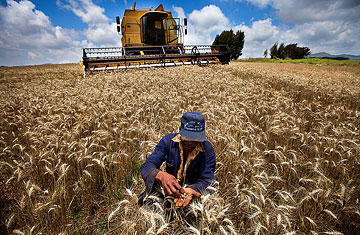
A farm worker inspects wheat ears before harvesting on a large-scale wheat farm in Timau, near Nanyuki, Kenya
Climate change is the environmental problem that obsesses us, the one that's the focus of high-flying international summits and hardcore national politics. But it's not the only environmental problem — and it's not even the biggest one. That happens to be the crisis in agriculture and land use, the subject of what Jon Foley — the head of the University of Minnesota's Institute on the Environment — calls the "other inconvenient truth." Put simply, the act of feeding 7 billion plus human beings already puts more stress on the planet than any other single activity — and with both population and global wealth continuing to grow, we're going to need to figure out a way to produce more food without further damaging the environment. Otherwise we may end up running out of both food and the planet.
Of course, exactly how we should address these problems is the subject of fierce debate in the U.S. and beyond. Is the solution to go organic as much as possible, or should we focus on trying to extend the fertilizer and irrigation of the Green Revolution to underperforming agricultural areas in Africa and Asia? Do we need to change our diet and reduce meat consumption, or is it simply unrealistic to expect more of us to become semi-vegetarians — especially among the rising global middle class just getting a chance to eat like Americans? How much value do intact forests and wildlife habitat have as we struggle to feed the 1 billion people who go to bed hungry each night? And is it really food production we need to improve, or distribution?
I've had a chance to hear Foley ponder his inconvenient truth a couple of times recently — first at a panel I moderated at the New York Academy of Sciences, and then at the Cooking for Solutions conference at the Monterey Aquarium in California. I like Foley because he can distill the big questions facing the human race in a handful of striking facts or images, but also because he approaches those same questions with a resolute pragmatism you don't always find in the environmental field — especially when it comes to food. "Can we feed the world and sustain the planet?" asks Foley. "Yes it's possible. But not with business as usual."
It's important to understand just how massive global agriculture's footprint really is. First there's simply the matter of land: 6.2 million sq. mi (16 million sq. km) are currently used to grow crops — an amount of land about equal to the size of South America — while 11.6 million sq. mi (30 million sq. km) has been set aside for pastureland, an area equal to the entire African continent. Altogether that's more than 40% of the dry land on the planet. We use 60 times more land to grow and raise food than we do to live on. Farming takes half the world's available freshwater, much of which is used for irrigation. And all that activity — plus the deforestation and degradation that tends to go hand in hand with farming — helps make agriculture the single biggest source of manmade greenhouse gases, more than industry or transportation or electricity generation. "We are running out of everything," says Foley. "We are running out of planet."
That's worrying enough today, given the fact that so many human beings remain hungry even in this moment of unprecedented abundance. But depending on population growth and global diets, we may need to produce twice as much food by mid-century as we do now. The simplest way to grow more food is to farm on more land, but that would come with major environmental consequences. The arable territory that we haven't transformed into cropland or pastureland tends to be forest, including the great rainforests of South America and Asia. Cutting those forests down — as we're already doing now — might help produce more food, but it would come with a major environmental cost. We'd be wiping out the most important wildlife habitats left on this crowded planet, even as we add more carbon to the atmosphere through deforestation. "We need to freeze the footprint of agriculture," says Foley. "We need to farm the land we do farm better."
